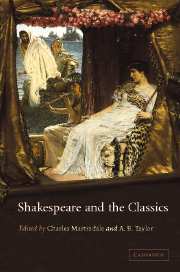Book contents
- Frontmatter
- Contents
- Notes on contributors
- List of abbreviations
- Introduction
- PART I AN INITIAL PERSPECTIVE
- PART II ‘SMALL LATINE’
- 2 Petruchio is ‘Kated’: The Taming of the Shrew and Ovid
- 3 Ovid's myths and the unsmooth course of love in A Midsummer Night's Dream
- 4 Shakespeare's learned heroines in Ovid's schoolroom
- 5 Shakespeare and Virgil
- 6 Shakespeare's reception of Plautus reconsidered
- 7 Shakespeare, Plautus, and the discovery of New Comic space
- 8 ‘Confusion now hath made his masterpiece’: Senecan resonances in Macbeth
- 9 ‘These are the only men’: Seneca and monopoly in Hamlet 2.2
- PART III ‘LESSE GREEK’
- PART IV THE RECEPTION OF SHAKESPEARE'S CLASSICISM
- Select bibliography (compiled by Joanna Paul)
- Index
6 - Shakespeare's reception of Plautus reconsidered
Published online by Cambridge University Press: 22 September 2009
- Frontmatter
- Contents
- Notes on contributors
- List of abbreviations
- Introduction
- PART I AN INITIAL PERSPECTIVE
- PART II ‘SMALL LATINE’
- 2 Petruchio is ‘Kated’: The Taming of the Shrew and Ovid
- 3 Ovid's myths and the unsmooth course of love in A Midsummer Night's Dream
- 4 Shakespeare's learned heroines in Ovid's schoolroom
- 5 Shakespeare and Virgil
- 6 Shakespeare's reception of Plautus reconsidered
- 7 Shakespeare, Plautus, and the discovery of New Comic space
- 8 ‘Confusion now hath made his masterpiece’: Senecan resonances in Macbeth
- 9 ‘These are the only men’: Seneca and monopoly in Hamlet 2.2
- PART III ‘LESSE GREEK’
- PART IV THE RECEPTION OF SHAKESPEARE'S CLASSICISM
- Select bibliography (compiled by Joanna Paul)
- Index
Summary
It has long been recognised that Elizabethan playwrights took many suggestions concerning comic characters, intrigue, and other structural elements from the comedies of Plautus and Terence; Terence is justifiably considered to be the more refined dramatist, to have invented the double plot, and to have made dramaturgic changes so as to create suspense, yet Plautus deserves the greater attention since he stimulated Shakespeare's imagination in many ways. It is not mere chance that he used two of his plays, his Menaechmi and Amphitruo, as the basis for The Comedy of Errors. During the Renaissance Plautus' reputation was great; performances of his works were outstanding events, especially those of the Menaechmi. It is possible that as a grammar school pupil Shakespeare himself took part in a performance of one of Plautus' comedies and that as a schoolmaster during his ‘lost years’ he translated the Menaechmi. There is no reason to maintain the old prejudice that Plautus is merely the author of knockabout farces. It is true that in most of his plays he is sceptical about including serious topics of general import, and he prefers to present ‘a “Saturnalian” inversion of normal values’. This aspect was first extensively demonstrated by E. Segal who took up suggestions from C. L. Barber's study on the saturnalian element in Shakespeare. That there are serious topics in Plautus, too, can, for example, be clearly seen in his Captivi; there a slave, who, in favour of his master, momentarily denies his own identity, pretends to be his master himself.
- Type
- Chapter
- Information
- Shakespeare and the Classics , pp. 107 - 121Publisher: Cambridge University PressPrint publication year: 2004
- 1
- Cited by

